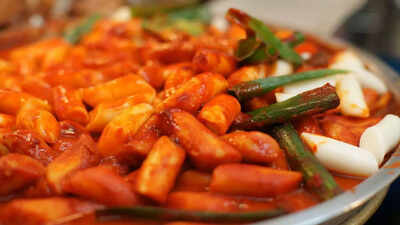ARTICLE AD BOX

Baek Se-hee, the South Korean author whose memoir I Want to Die but I Want to Eat Tteokbokki gave a generation language for their inner battles, passed away this week at the age of 35.
At the heart of her book — and her philosophy — lies one simple, ordinary, and profoundly meaningful thing: tteokbokki.What exactly is tteokbokki?
What exactly is tteokbokki?
Tteokbokki (떡볶이) is one of the most iconic comfort foods in Korea — a humble street snack made of soft, chewy rice cakes (tteok) simmered in a vibrant, fiery sauce of gochujang (fermented chilli paste), sugar, soy sauce, and garlic. It is cheap, filling, and unpretentious.
Sold at street stalls and food carts across the country, it’s the sort of dish teenagers eat after school while gossiping, couples share on chilly nights, and tired workers grab on their way home.More than just food, tteokbokki carries deep emotional weight. It evokes memories of childhood, of late-night laughter, of everyday rituals. Its texture — comforting and familiar — and its spice — sharp but satisfying — make it a symbol of warmth and belonging.
It’s not a dish reserved for special occasions or elaborate dinners. It’s the food of ordinary life, a small joy that asks for nothing more than your appetite.
And that ordinariness is precisely why Baek chose it.
From snack to symbol
When Baek titled her memoir I want to die but I want to eat tteokbokki, she wasn’t trying to be quirky or provocative. She was capturing the most profound paradox of living with depression: that even in the deepest despair, the human heart still clings to tiny, comforting pleasures.
The desire to eat tteokbokki — something so mundane, so simple — becomes proof that the will to live, however faint, still exists.This contradiction sits at the core of her work. Depression, Baek argues, is not a total erasure of desire but a constant negotiation between emptiness and yearning. One part of you wants to vanish. Another part wants a warm, spicy meal. And neither cancels the other out. That coexistence — absurd yet deeply human — is why the metaphor resonated so widely.By using tteokbokki, Baek anchored a universal psychological struggle in a specifically Korean cultural symbol. The dish’s ordinariness stripped the topic of abstraction. It grounded existential despair in something tactile and relatable — a street snack you could smell, taste, and crave. In doing so, Baek taught her readers that survival doesn’t always look like triumph. Sometimes, it looks like reaching for a bowl of rice cakes when you think nothing matters.
A radical memoir in its simplicity
The book itself was unlike anything readers had seen. Published in 2018, it contained no sweeping narrative arcs or happy endings — only transcripts of Baek’s therapy sessions, rendered with startling honesty. Critics described it as “radical in its fragility.” It offered no solutions, only the raw texture of sadness, confusion, and slow, uneven healing. And that was precisely why it struck a chord.In a society where mental illness is often silenced, Baek’s openness was revolutionary.
What started as personal therapy notes shared online grew into a cultural phenomenon. When the English translation appeared in 2022, the book transcended language and geography, selling more than a million copies and being translated into over 25 languages.
Redefining healing and resilience
The line “The human heart, even when it wants to die, quite often wants at the same time to eat some tteokbokki” soon escaped the page. It appeared in essays, therapy rooms, tattoos, and social media bios.
It became shorthand for a universal truth: that despair and desire can coexist, and that wanting something small — a conversation, a meal, a moment — is reason enough to keep going.Baek’s great contribution was refusing to tidy up human pain. She normalised contradiction. She showed that fragility is not failure, that healing is not linear, and that resilience can be as simple as getting up for lunch. In a world obsessed with solutions, she offered companionship — the sense that it’s okay to exist in the messy middle.
A legacy that outlived her
Baek died in 2025, but even in death, her generosity endured — she donated her organs, saving five lives. Her words, however, saved millions more. They taught readers that despair does not mean defeat, that craving something small can be an act of survival, and that even when you want to disappear, the longing for tteokbokki means part of you still wants to live.And perhaps that is the essence of her legacy: a reminder that life’s simplest pleasures — spicy rice cakes on a cold evening — can hold profound meaning. They are not just snacks. They are signals from the heart saying, not yet.

 1 week ago
5
1 week ago
5









 English (US) ·
English (US) ·